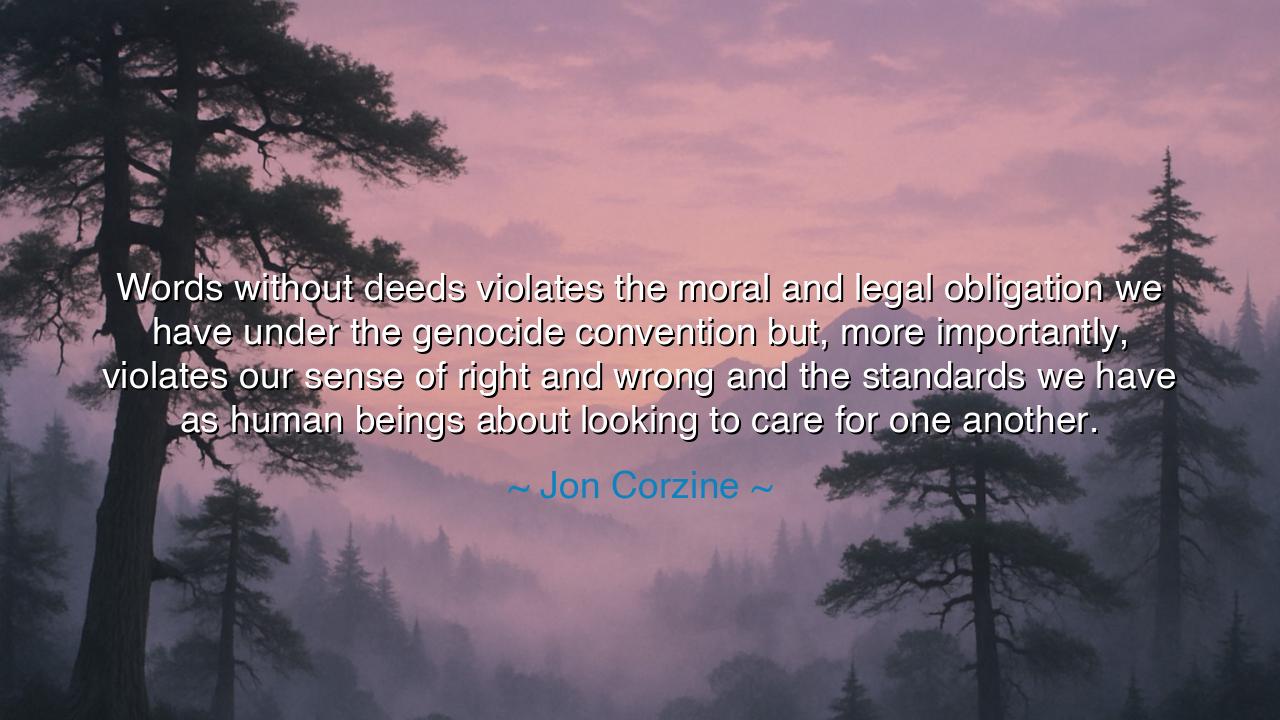
Words without deeds violates the moral and legal obligation we
Words without deeds violates the moral and legal obligation we have under the genocide convention but, more importantly, violates our sense of right and wrong and the standards we have as human beings about looking to care for one another.






Hear, O children of memory and of conscience, the words of Jon Corzine: “Words without deeds violates the moral and legal obligation we have under the genocide convention but, more importantly, violates our sense of right and wrong and the standards we have as human beings about looking to care for one another.” These words are a cry against the emptiness of promises unfulfilled, against the cowardice of voices that speak of justice but lift not their hands to defend it. For what good is the tongue that condemns evil, if the body does not move to resist it? To know the truth and fail to act is to stand guilty with those who commit the crime.
The ancients knew this lesson well. To declare an oath and not keep it was to bring dishonor upon one’s house. To pledge aid in war and then abandon one’s allies was counted as treachery worse than open enmity. So too in our own age, when nations gather and speak solemnly of peace, of dignity, of the defense of the weak, but fail to act when genocide rises before their eyes, their words are ashes. The treaties they sign—the Genocide Convention, the pacts of nations—are not decorations of parchment but legal obligations; and beyond law, there is the deeper call of morality, the eternal duty to shield the innocent.
Consider the story of Rwanda in 1994. The world watched as neighbor slew neighbor, as a million lives were extinguished in a hundred days. Leaders spoke, reports were written, condemnations were made, yet action came too late. The soldiers that could have saved tens of thousands were held back, the words of nations dissolved into inaction. Here, the truth of Corzine’s words burns like fire: words without deeds betray both law and humanity. For the law demanded intervention, and the heart demanded compassion, yet both were silenced by the cowardice of delay.
Yet there are also stories of courage, when words were joined with deeds. Recall the Danish people under Nazi occupation, who, when told their Jewish neighbors would be taken, rose up not only with voices but with action. They ferried thousands across the sea to Sweden, saving lives at great peril to themselves. Their words of solidarity became flesh in their deeds of rescue. In this they fulfilled both moral duty and human dignity, showing that the true standard of humanity is to care for one another when the world grows dark.
The meaning of Corzine’s words is thus both simple and severe: words may inspire, but without deeds, they condemn the speaker. For laws exist not to be recited but to be lived; morality exists not to be admired but to be practiced. To sign treaties against atrocity yet ignore their violation is to mock justice itself. To say “never again” while watching it happen again is to speak blasphemy against the memory of the dead.
The lesson for future generations is clear: do not let your words outrun your actions. If you condemn injustice, stand against it. If you pledge protection, keep it. If you declare compassion, embody it in sacrifice. The measure of humanity is not the eloquence of its speeches but the courage of its deeds. The weak and vulnerable cannot be saved by promises—they can only be saved by action.
Practical action lies before us: hold leaders accountable when their words fail to become deeds. Educate yourselves and others so that you may recognize injustice in its early stages, and do not wait for history to repeat itself. Support organizations that act where governments falter, and in your own sphere, be vigilant: if you see suffering, do not only speak of compassion—practice it. For every life defended, every hand extended, is a step toward fulfilling both the moral and the legal obligations of our shared humanity.
So let it be remembered: words without deeds are like a lamp without oil, flickering and useless in the night. But when words are joined to action, they become a beacon that guides nations and individuals alike toward righteousness. Choose, then, not to speak only, but to act; not to promise only, but to fulfill. In this lies the path of justice, and in this lies the hope of the world.






AAdministratorAdministrator
Welcome, honored guests. Please leave a comment, we will respond soon